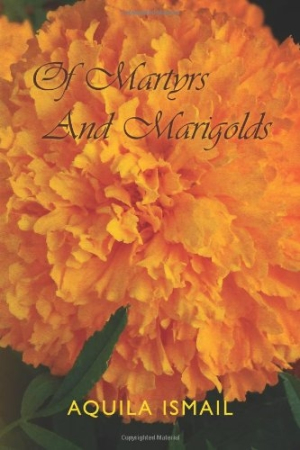Of Martyrs and Marigolds
This harrowing historical novel begins and ends with a haunting image: “February in Bangladesh is the month of martyrs to the mother tongue and girls in red bordered yellow saris offer marigolds to them.” Educator Aquila Ismail has woven elements of her own life into a fictional tapestry of love, sorrow, violence, and regret.
The author’s family emigrated from India in the late 1940s, the time of Indian independence, to what was then called East Pakistan. In the early 1970s, when Ismail was a university student, trouble arose between what is now called Pakistan (then “West Pakistan”) and its eastern sister state. History records in glowing terms the struggles of the Bengalis (natives of East Pakistan, once called the Bengal State) to form a new nation, Bangladesh. However, there has been little acknowledgement of the Bengalis’ own bloody oppression of those within Bangladesh considered to be political enemies.
As the Bengali revolution ramps up, the fictional character Suri—who is based on the author—and her extended family are increasingly targeted as enemies of the Bengali regime because Suri has chosen to study Urdu, the language of West Pakistan. Meanwhile, young Urdu-speaking men are secretly slaughtered in a terrifying campaign of unofficial genocide, and women are raped and thrown into concentration camps. Bengali liberationists unfairly label Urdu speakers as ignorant peasants (“Biharis”) who must be controlled. The outside world is clueless, and the international press unwittingly helps perpetuate this lie.
Suri gradually loses everything; the pleasant life she once enjoyed is stripped away along with her home, possessions, and dignity. She soon realizes that her school friends, most of whom speak Bengali, can’t afford to even talk to her. In addition, Suri’s academic accomplishments go unrecognized because she cannot prove she is a native-born Bengali. Suri’s only friend and persistent ally is her Bengali boyfriend, Rumi, who falls in love with her at first sight and whose family continues to try to protect her. She eventually begins to wonder if this protection comes at too big a price—for Rumi, and for herself.
Ismail is an academic writer who has translated both nonfiction and poetry. She writes here with emotional flair, as evidenced in the voice of her young heroine. Ismail’s characters garner both sympathy and interest from the reader. Especially memorable is Suri’s loving father, Abbu, who is mentally destroyed by the conflict.
At points, readers may feel that the fictional plot is overshadowed by the author’s zeal to provide a glut of precise facts about her country’s bloody past. As a survivor of an internment camp in Bangladesh, Ismail’s bitterness and frustration at times predominate. One could question why she did not simply write a memoir of these events so that the factual details could be presented in a proper context.
A cry of despair and grief, Of Martyrs and Marigolds reveals a heretofore little-examined piece of modern Islamic history and how one family struggled to survive oppression from their own people. Students of Asian history and those seeking to better understand Muslim culture will want to read this book, which converts a closely held family tragedy into a complex parable with subtle lessons about the danger of “isms.”
Reviewed by
Barbara Bamberger Scott
Disclosure: This article is not an endorsement, but a review. The publisher of this book provided free copies of the book and paid a small fee to have their book reviewed by a professional reviewer. Foreword Reviews and Clarion Reviews make no guarantee that the publisher will receive a positive review. Foreword Magazine, Inc. is disclosing this in accordance with the Federal Trade Commission’s 16 CFR, Part 255.

